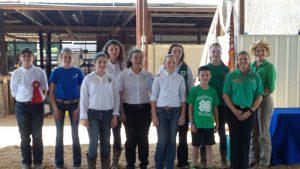by Jena Gilmore | Nov 10, 2016
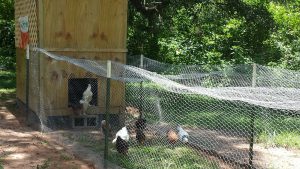
Youth unable to keep chickens at home were able to participate through Cooperative Coops at County Extension Offices. Photo credit: Heather Kent
On Saturday, October 29th, 4-H’ers from across the panhandle suited up in their 4-H Show gear, loaded up their chickens and ventured off to the inaugural Florida 4-H Chick Chain hosted at the Walton County Fairgrounds. This project was piloted last year with Alabama 4-H and is now an annual small animal science project offered here in the panhandle.
The objectives of the project are to help youth learn poultry nutrition and care, to develop communication skills, to develop basic record keeping skills, and to develop responsibility. Over 80 youth participated and have been raising their pullets since May. Over the summer, they participated in webinars and workshops to help prepare them for the show and complete their record books. Some youth participated individually, some youth shared pullets with their siblings (making it a family project). Youth not able to have chickens at their home were able to participate through a Cooperative Coop. Cooperative coops are housed at the Extension Office and youth have the opportunity to sign up for shifts to help “rule the roost” by feeding and watering the chicks, monitoring their health, changing bedding, and cleaning the coop.
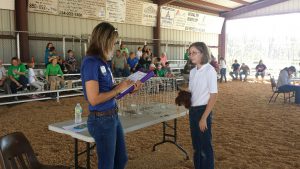
Youth were judged on poise, confidence and how they handled their birds. Photo credit: Heather Kent
On Show and Auction day, youth experienced many opportunities to showcase their “egg-celent” skills they learned through the Florida 4-H Chick Chain project. First, youth were required to check-in their birds at registration with the Agriculture Inspector. This was the final step in determining if the youth had followed all the proper bio-security measures to keep their chickens happy, healthy and disease free. Next, youth participated in a skill-a-thon to demonstrate what they have learned about breed identification, poultry anatomy, and how to set up a brooder properly. During the show, youth demonstrated their knowledge and communication skills with confidence. Youth were judged on how prepared they were to answer questions about their project and how well they handled their birds.
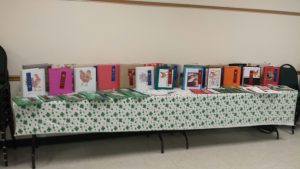
Youth kept records of their project and books were judged and displayed during the show.
Do you have a passion for poultry? If so, consider sharing it with 4-H as a volunteer. 4-H needs volunteers to help teach life skills through projects like this by sparking a lifelong interest in learning, Contact your local UF IFAS County Extension Office or visit http://florida4h.org.
Helpful Resources:
| Junior Showmanship |
1st |
Jena Putnam |
| 2nd |
Sheldon Sparks |
| 3rd |
Jake Rinehart |
| 4th |
Cass Dillard |
| 5th |
Ashlynn Peebles |
| Intermediate Showmanship |
1st |
Katie Ballard |
| 2nd |
Adrienne Murray |
| 3rd |
Lily Smith |
| 4th |
Isaac Hosford |
| 5th |
Kailey Pettis |
| Senior Showmanship |
1st |
Mary Ballard |
| 2nd |
Klarissa Williamson |
| 3rd |
Ashlynn McDevitt |
| 4th |
Myra Miles |
| 5th |
Jayla Kindlespire |
| County Best of Show Grand & Reserve |
HOLMES |
G – Joshua Ernst
R – Emily Ernst |
| JACKSON |
G – Nathan Ziglar
R – Beau Miles |
| JEFFERSON |
G – Jake Rinehart
R – Ashlynn Peebles |
| LIBERTY |
G – Isaac Hosford
R – Millie Revell |
| OKALOOSA |
G – Lily Smith
R – Kaelen Chenard |
| SANTA ROSA |
G – Cayden Smith
R – Cat Proud |
| WAKULLA |
G – Adrienne Murray |
| WALTON |
G – Krista Laviolette
R – Leannah McDevitt |
| WASHINGTON |
G – Cole & Cass Dillard
R – Lillian, Sheldon Sparks & Natalie Taylor |
| Breed Best of Show Grand & Reserve |
BRAHMA |
G – Lily Smith
R – Cole & Cass Dillard |
| DOMINIQUE |
G – Jake Rinehart
R – Krista & Julie Laviolette |
| LEGHORN |
G – Beau Miles
R – Mary Ballard |
| POLISH |
G – Lillian & Sheldon Sparks, Natalie Taylor
R – Nathan Ziglar |
| RHODE ISLAND RED |
G – Emily Ernst
R – Jenna Putnam |
| WYANDOTTE |
G – Jayla Kindlespire
R – Kaelen Chenard |
| Overall Grand & Reserve (New) |
G – Lily Smith
R – Beau Miles |
| Overall Grand & Reserve (Returning) |
G – Emily Ernst
R – Myra Miles |
by Julie Pigott Dillard | Mar 4, 2016
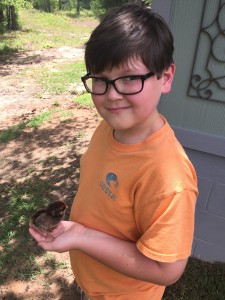
Chick Chain is a great way for youth to learn life skills such as responsibility and record keeping while developing an appreciation for agriculture.
Can you feel it? The promise of spring is in the air. Pollen is falling, grass is greening up, azaleas are blooming and it’s time to kick off the 2016 Florida 4-H Chick Chain project. This program is designed to help youth learn how to raise baby chicks to laying age while learning responsibility, record keeping and communication skills. How does the 4-H Chick Chain work? Youth will select two breeds of chickens to raise and take ownership of 12 baby chicks. Breeds include:
- Pearl White Leghorn
- Rhode Island Red
- Dominque
- Golden Laced Wyandotte
- Polish Top Hat
- Buff Brahma
Youth will raise the chicks to about 22 weeks old and then participate in a district show and showmanship contest with their three best pullets (young hens less than one-year-old) from one breed. If there is more than one child in your family, you can choose to share one project.
The 4-H Chick Chain is designed to take you step by step through the process of raising your birds to healthy laying age. Before you take ownership of your chicks, you’ll participate in a youth/parent workshop where you’ll receive a production manual and tips to make your project a success. During the summer, there will be a care and showmanship workshop in your 4-H district. Your 4-H Agent or volunteer will also make a home visit to check up on your progress. We’ll also have a record book workshop to help you tackle the record keeping part of your project.
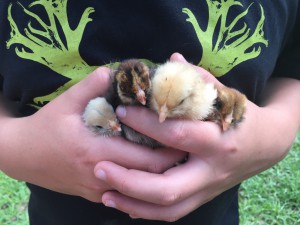
Youth will learn about animal nutrition, health and biosecurity as part of the 4-H Chick Chain.
The 4-H Chick Chain is open to all youth ages 5-18. Registration cost is $50 and includes your 12 chicks, production manual and entry for the show and showmanship contest.
How do I sign up? To register for the 4-H Chick Chain, click here: 2016 Chick Chain Registration Form. Follow the instructions on the registration form, and contact your 4-H Agent if you have questions. Youth who participated in the 2015 4-H Chick Chain can register their hens to show in a production class.
If you have a love of poultry that you would like to share with others, consider becoming a 4-H poultry project leader. Volunteer positions are currently available to support 4-H Embryology in the Classroom, Chick Chain, and 4-H Poultry Clubs. Contact your local UF IFAS Extension Office or visit http://florida4h.org/volunteers to find out more.
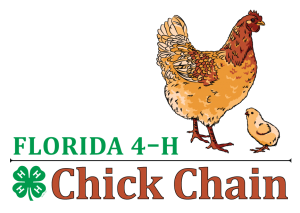
by pmdavis | Mar 27, 2015
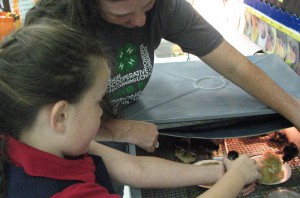 It’s almost Easter when lots of people think about those cute little chicks. Before you take on one of those cute little animals– let’s talk about the responsibilities and considerations when raising chickens
It’s almost Easter when lots of people think about those cute little chicks. Before you take on one of those cute little animals– let’s talk about the responsibilities and considerations when raising chickens
Keeping chickens isn’t much different than keeping pets – they need to be fed and watered every day and, yes, you have to deal with poop. However, most local veterinarians won’t check chickens, so you’ll also need to monitor your birds to know if a health intervention is needed. Handling and socializing your chickens from an early age makes it easier to get them to cooperate, but it also makes it more fun for you to enjoy their antics and unique personalities. If you’re thinking about getting chickens, the first thing to ask yourself is “why?” For human food production, self-sufficiency, selling eggs, entertainment, education for kids or simply as pets? Owning chickens can be all of these 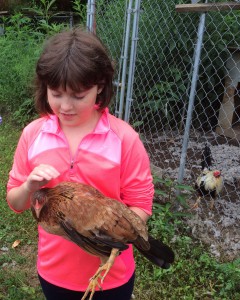 things. Your “why” will help you determine how much you want to invest, as well as guide you to what kind of chickens and coop you will need.
things. Your “why” will help you determine how much you want to invest, as well as guide you to what kind of chickens and coop you will need.
Everything from a few backyard chickens to 4-H projects and farms with several hundred chickens can be considered “small”. Just because a flock is small, does not mean that stewardship, efficient production, safe handling, and other rules can be ignored. Keeping a small flock of chickens for home use, a practice commonplace during our grandparents’ time, is becoming popular again. If you are considering this, you will need to educate yourself about poultry feeding, health and egg production, as well as food safety. There are many University publications on the web.
The University of Florida’s Institute of Food and Agricultural Sciences Extension has several articles on keeping chickens. UF/IFAS Extension has a section devoted to backyard poultry , Basic Guide for the Backyard Chicken Flock, which includes information about brooding, housing, feeding and nesting needs of birds. Other sites include: Escambia County Backyard Poultry Guide and Urban Farming Chickens 101. Other universities with excellent Extension resources to help with backyard poultry include: Mississippi State; Penn State; Purdue Extension; Colorado State Extension; a University of Minnesota and The University of Illinois Extension lists 33 resources on poultry. Another useful site is Illini PoultryNet.
Taking care of the chicks provides a fun way for kids to develop a sense of responsibility, while teaching them work ethics and healthy eating habits. Other ways your children could participate in 4-H and learn about poultry include: The 4-H & Farm Bureau Ag-in-the Classroom Embryology School Enrichment program offered in many counties. There are other activities that youth can engage in including poultry production, judging of poultry and poultry products, preparing foods using poultry and public presentations to inform others about chickens and poultry. Youth can compete in activities at the county, district, state and national levels. 4-H is one of the nation’s most diverse organizations and includes people from all economic, racial, social, political, and geographic categories. There are no barriers to participation by any young person. Participants are given the opportunity to engage in activities that hold their personal interest, while being guided by adult volunteers. The local 4-H Agent is a youth development professional who provides direction and program leadership as part of the nationwide Cooperative Extension System. For more information, contact your local UF/IFAS Extension Office or check out our web-site.




